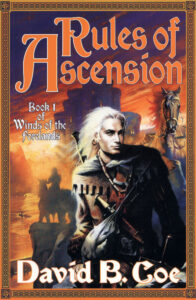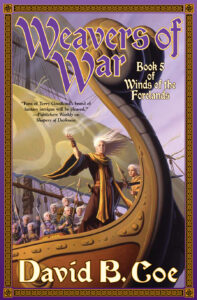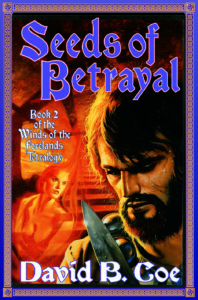Today, I bring you one more “Middles” post in my several-weeks-long feature on “Beginnings, Middles, and Endings.” You can find past posts in the series here, here, and here.
I made the self-evident point a couple of weeks ago that the vast middle of any book is by far the largest segment, which is why I have spent a few weeks on the subject. At the same time, though, there are as many different ways to approach the middle (and the beginning, and the ending) as there are books to be written, which is to say there’s an infinite number. And so there are only so many specifics I can offer. This, it seems to me is especially true of the middle. Beginnings share a common purpose — we use them to hook our readers. Endings seek to cap off our narratives, tie off loose ends and, perhaps, hint at additional story elements to come in subsequent volumes.
The purpose of the middle is to tell the story. How’s that for vague?
As I say, the middle can take readers literally anywhere. That said, though, I believe strongly that every scene in the vast middle has to serve a narrative purpose. This is one reason why I tend to rely on an outline when I write. Even if that outline is rough and purposefully sketchy, it helps me organize my thoughts and plan out my story. I don’t do it because I’m OCD. (I mean, I am OCD, but that’s not why I outline. Or at least it’s not the only reason. Okay, moving on . . . .) I do it because I don’t want wasted pages in my manuscript. I want my pacing as taut and clean as it can be.
 I am currently reading through my Winds of the Forelands series, editing OCR scans of the books in order to re-release them sometime in the near future. Winds of the Forelands was my second series, a sprawling epic fantasy with a complex, dynamic narrative of braided plot lines. At the time I wrote the series (2000-2006) I worked hard to make each volume as coherent and concise as possible. Looking back on the books now, I see that I was only partially successful. I’m doing a light edit right now — I’m only tightening up my prose. The structural flaws in the series will remain. They are part of the story I wrote, and an accurate reflection of my writing at the time. And the fact is, the books are pretty darn good.
I am currently reading through my Winds of the Forelands series, editing OCR scans of the books in order to re-release them sometime in the near future. Winds of the Forelands was my second series, a sprawling epic fantasy with a complex, dynamic narrative of braided plot lines. At the time I wrote the series (2000-2006) I worked hard to make each volume as coherent and concise as possible. Looking back on the books now, I see that I was only partially successful. I’m doing a light edit right now — I’m only tightening up my prose. The structural flaws in the series will remain. They are part of the story I wrote, and an accurate reflection of my writing at the time. And the fact is, the books are pretty darn good.
 But when I hold Winds of the Forelands up beside the Radiants books, or the Chalice War novels, or even my Islevale Cycle, which is my most recent foray into big epic fantasy, the older story suffers for the comparison. There are so many scenes and passages in WOTF that I could cut without costing myself much at all. The essence of the storyline would remain, and the reading experience would likely be smoother and quicker. — Sigh — So be it.
But when I hold Winds of the Forelands up beside the Radiants books, or the Chalice War novels, or even my Islevale Cycle, which is my most recent foray into big epic fantasy, the older story suffers for the comparison. There are so many scenes and passages in WOTF that I could cut without costing myself much at all. The essence of the storyline would remain, and the reading experience would likely be smoother and quicker. — Sigh — So be it.
Again, the purpose of outlining, and the purpose of revising and editing, ought to be to make our work as concise and focused as possible. I can think of several books by big name authors that have in their vast middles scenes that meander, that serve little or no narrative purpose, that (in my opinion) actually detract from the larger story. I won’t name the books or authors, but chances are you have come across similar scenes in books you’ve read. Maybe you’ve encountered the same ones I’m thinking of. This is the sort of thing we want to avoid. Big name authors can get away with doing this occasionally. Authors seeking to break into the business, or mid-list authors looking to move up the ladder, simply can’t.
So, how do we avoid those superfluous, serve-no-purpose scenes?
Well, as I’ve said already, one way to avoid them is to outline. I know there are many dedicated so-called “organic writers” out there, and I respect that. Again, I outline loosely, precisely because I want to maintain the organic quality of my writing. Still, outlining really can help keep us from straying from our crucial plot points.
So can something called Vernor’s Rule. This is a writing principle I have discussed before in various venues. Allow me to explain it again here. “Vernor” is multiple Hugo-award winning author Vernor Vinge, who is best known for such books as A Fire Upon the Deep and A Deepness In the Sky. For a time, he and I had the same editor at Tor Books — that editor is the person who first told me of Vernor’s Rule.
Vernor’s Rule goes like this: There are basically three things we authors do as storytellers. We advance our plots, we build character, and we fill in background information. (Yes, this oversimplifies things a bit, but if you think about it you soon see that all we write can be placed under these three broad headings.) Every scene we write should be doing at least two of these things simultaneously. Preferably, each scene should do all three things at once. If a scene only accomplishes one of these things, or — heavens forbid — none of them, our narrative has stalled and we need to rework the scene.
Got that? If not, read the paragraph again — it sounds more complicated than it is. Really. It means essentially that writers need to multitask all the time. Every scene, every passage, ought to accomplish several things at once. That’s how we keep our narratives moving. That’s how we tackle the vast middle.
Next week we start endings. As it were.
Keep writing!









 I continue to read through and revise the books of my Winds of the Forelands epic fantasy series, a five-book project first published by Tor Books in 2002-2007. The series has been out of print for some time now, and my goal is to edit all five volumes for concision and clarity, and then to re-release the series, either through a small press or by publishing them myself. I don’t yet have a target date for their re-release.
I continue to read through and revise the books of my Winds of the Forelands epic fantasy series, a five-book project first published by Tor Books in 2002-2007. The series has been out of print for some time now, and my goal is to edit all five volumes for concision and clarity, and then to re-release the series, either through a small press or by publishing them myself. I don’t yet have a target date for their re-release. We are often our own most unrelenting critics. This is certainly true for me in other elements of my life. I am hard on myself. Too hard. And, on a professional level, I am the first to notice and criticize flaws in my writing. So reading through old books in preparation for re-release is often an exercise in self-flagellation. It was with the LonTobyn reissues that I did through Lore Seekers Press back in 2016. And it is again with the Winds of the Forelands books.
We are often our own most unrelenting critics. This is certainly true for me in other elements of my life. I am hard on myself. Too hard. And, on a professional level, I am the first to notice and criticize flaws in my writing. So reading through old books in preparation for re-release is often an exercise in self-flagellation. It was with the LonTobyn reissues that I did through Lore Seekers Press back in 2016. And it is again with the Winds of the Forelands books. As I have read through this first book in the story, polishing and trimming the prose, I have rediscovered that narrative. I remember far less of it than I would have thought possible. Or rather, I recall scenes as I run across them, but I have not been able to anticipate the storyline as I expected I would. There are so many twists and turns, I simply couldn’t keep all of them in my head so many years (and books) later.
As I have read through this first book in the story, polishing and trimming the prose, I have rediscovered that narrative. I remember far less of it than I would have thought possible. Or rather, I recall scenes as I run across them, but I have not been able to anticipate the storyline as I expected I would. There are so many twists and turns, I simply couldn’t keep all of them in my head so many years (and books) later. As I say, “trust your reader” is essentially the same as “trust yourself.” And editors use it to point out all those places where we writers tell our readers stuff that they really don’t have to be told. Writers spend a lot of time setting stuff up — arranging our plot points just so in order to steer our narratives to that grand climax we have planned; building character backgrounds and arcs of character development that carry our heroes from who they are when the story begins to who we want them to be when the story ends; building histories and magic systems and other intricacies into our world so that all the storylines and character arcs fit with the setting we have crafted with such care.
As I say, “trust your reader” is essentially the same as “trust yourself.” And editors use it to point out all those places where we writers tell our readers stuff that they really don’t have to be told. Writers spend a lot of time setting stuff up — arranging our plot points just so in order to steer our narratives to that grand climax we have planned; building character backgrounds and arcs of character development that carry our heroes from who they are when the story begins to who we want them to be when the story ends; building histories and magic systems and other intricacies into our world so that all the storylines and character arcs fit with the setting we have crafted with such care. And because we work so hard on all this stuff (and other narrative elements I haven’t even mentioned) we want to be absolutely certain that our readers get it all. We don’t want them to miss a thing, because then all our Great Work will be for naught. Because maybe, just maybe, if they don’t get it all, then our Wonderful Plot might not come across as quite so wonderful, and our Deep Characters might not come across as quite so deep, and our Spectacular Worlds might not feel quite so spectacular.
And because we work so hard on all this stuff (and other narrative elements I haven’t even mentioned) we want to be absolutely certain that our readers get it all. We don’t want them to miss a thing, because then all our Great Work will be for naught. Because maybe, just maybe, if they don’t get it all, then our Wonderful Plot might not come across as quite so wonderful, and our Deep Characters might not come across as quite so deep, and our Spectacular Worlds might not feel quite so spectacular. My struggle right now is simply this: Her feedback on this first book is quite extensive and requires that I rethink some fundamental character issues and cut or change significantly several key early scenes. And she’s right about all this stuff. No doubt. This first book has been through several revisions already, and the second half of the book — really the last two-thirds of the book — just sings. I love it. She loves it. The first third is where the problems lie. To be honest, the first hundred (manuscript) pages of this book have always given me the most trouble. I wrote the initial iteration of the book more than a decade ago, and in some ways those early chapters still reflect too much the time in which they were written. They feel dated.
My struggle right now is simply this: Her feedback on this first book is quite extensive and requires that I rethink some fundamental character issues and cut or change significantly several key early scenes. And she’s right about all this stuff. No doubt. This first book has been through several revisions already, and the second half of the book — really the last two-thirds of the book — just sings. I love it. She loves it. The first third is where the problems lie. To be honest, the first hundred (manuscript) pages of this book have always given me the most trouble. I wrote the initial iteration of the book more than a decade ago, and in some ways those early chapters still reflect too much the time in which they were written. They feel dated.